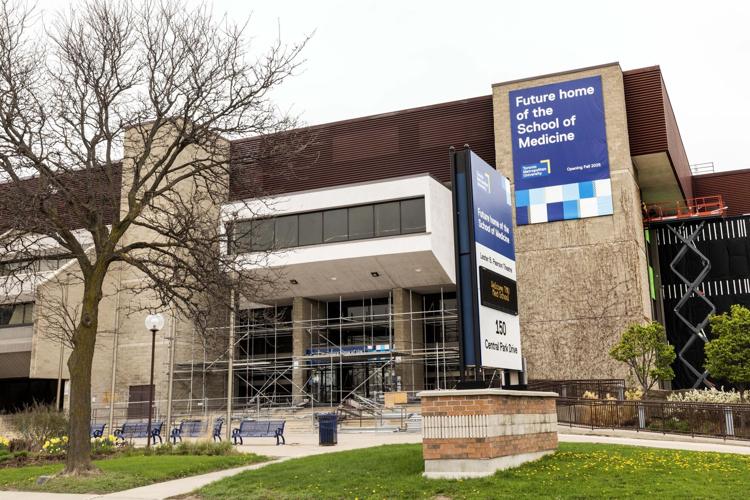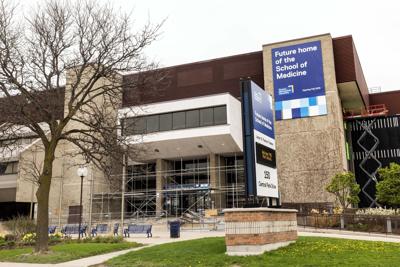When Ontario medical school admission offers go out Tuesday, those accepted into şŁ˝ÇÉçÇřąŮÍřMetropolitan University’s inaugural MD class will have earned a spot in one of the most competitive programs in the province.
With 6,415 applicants having vied for 94 seats, the acceptance rate — at 1.5 per cent — is exceptionally low, even by medical school standards.
Meanwhile, the average GPA of those invited to enrol this fall is 3.8 — on par with other schools and countering earlier concerns that TMU’s equity-focused admissions criteria, which features a 3.3 minimum GPA, no prerequisite courses and no MCAT requirement, would compromise academic standards.
“This was a very thorough process, with multiple stages and assessments to ensure the criteria was both competitive and fair,” Teresa Chan, the founding dean of TMU’s school of medicine, told the Star.
“Canadians want physicians who can gain medical expertise, but also become excellent communicators, leaders, collaborators, scholars and health advocates, and we are confident that our first classes of MD and postgraduate learners will be exactly the kind of physicians our province needs.” (.)
The medical school, which will operate out of the former Bramalea Civic Centre in Brampton, promotes itself as being the first in Canada to be “.”
The , stating it would “purposefully admit equity-deserving students” with a focus on applicants interested in practising primary care, particularly in medically underserved areas.
About one-third of Tuesday’s offers are going to applicants in
Last fall, TMU president Mohamed Lachemi had to walk back what he described as “aspirational language” on the school’s website that referenced enrolment targets for Black, Indigenous and other equity-deserving groups. Following public backlash — and an intervention by the Doug Ford government — Lachemi clarified that the medical school had never set quotas.
But TMU’s admission requirements still raised eyebrows, even as Ontario’s six other medical schools have also adopted strategies to reduce systemic barriers and diversify their student population.
TMU’s minimum required grade point average — a cumulative measure of a student’s academic performance on a 4.0 scale — was set at 3.3, higher than the medical school thresholds at McMaster, NOSM and ˛ĎłÜ±đ±đ˛Ô’s universities. Each university weighs GPA differently in the application process. Meeting the minimum just gets an application through the door but is no guarantee of getting into Ontario’s highly competitive medical schools, where the acceptance rate last fall was between 2.6 and 7.3 per cent.
TMU also decided to eliminate the MCAT (Medical College Admission Test), a standardized exam that covers scientific principles and critical reasoning and has been widely used to evaluate potential medical students for nearly a century. Increasingly, for reflecting socio-economic privilege more than indicating a student’s future success.
Of 18 accredited medical schools across the country, seven do not require an MCAT, including University of Ottawa and NOSM in northern Ontario. McMaster looks at the score on only one portion of the test (critical analysis and reasoning skills).
TMU also chose to forgo the widely used CASPer (Computer-Based Assessment for Sampling Personal Characteristics), a situational judgment test that was developed by McMaster as a way to assess personal and professional attributes.
But GPA, the MCAT and CASPer are just a few of the many standard requirements for applying to Ontario’s medical schools, which are offered at , , , , and universities. All require an autobiographical sketch and references; some demand prerequisite science courses; others ask for essays addressing supplemental questions. (TMU, for example, asked applicants about their experiences supporting marginalized groups and their connection to Brampton/Peel Region.) Then, only a small portion of applicants move on to the interview stage.
˛ĎłÜ±đ±đ˛Ô’s University, in an attempt to “level the playing field for prospective students,” altered its interview process this year by introducing a lottery system. Applicants who met minimum thresholds were then randomly selected for an interview. ˛ĎłÜ±đ±đ˛Ô’s previously said it had so many qualified candidates to review that it had to “use inflated standards (for MCAT, CASPer and GPA scores) to pare the applicant list down.” The new process, the university has said, would
˛ĎłÜ±đ±đ˛Ô’s would not respond to specific questions about how the lottery fared but noted its medical school received 5,083 applications for this fall and conducted 729 interviews. (Last year, the university received 5,227 applications and held 601 interviews.)
˛ĎłÜ±đ±đ˛Ô’s, like all Ontario medical schools, has also introduced pathways for equity-deserving groups. In most cases, this means Black, Indigenous and students of lower socioeconomic status who meet admittance criteria set by the schools also have the opportunity to submit personal statements.
˛ĎłÜ±đ±đ˛Ô’s said it will soon share details of its recruitment strategy and dedicated supports for Black students applying for entry in 2026-27, adding it will have no quotas.
No matter the background, most successful applicants to Ontario’s medical schools come from within the province. Last fall, at least 90 per cent of the incoming cohorts at Western, şŁ˝ÇÉçÇřąŮÍřand McMaster medical schools were made up of Ontarians. At NOSM, whose campuses are in Thunder Bay and Sudbury, 83 per cent of its 2024 class came from northern Ontario.
Out of the TMU offers going out Tuesday, 90 per cent are for Ontario students; of that, 62 per cent are from the Greater şŁ˝ÇÉçÇřąŮÍřArea, with 13 per cent from the city itself.
And despite remarks last fall by Ford about students from outside the country taking up seats, there are actually very few international students in Ontario’s MD programs. Only three schools are even open to such applicants. (The 18 per cent figure Ford had referenced was for medical school graduates who are in residency training.)
Ford made the comments while sharing his government’s plans to introduce legislation that would ensure at least 95 per cent of medical spots be reserved for Ontario residents (and five per cent from the rest of Canada), as well as announcing an to train more family doctors in the province. At the time, the health minister pledged every Ontarian will have access to a family doctor within five years.
TMU’s new medical school, together with York University — which is planning to open a med school in Vaughan in 2028 — will, according to the province, be the largest increase in medical spots in more than a decade.



























To join the conversation set a first and last name in your user profile.
Sign in or register for free to join the Conversation